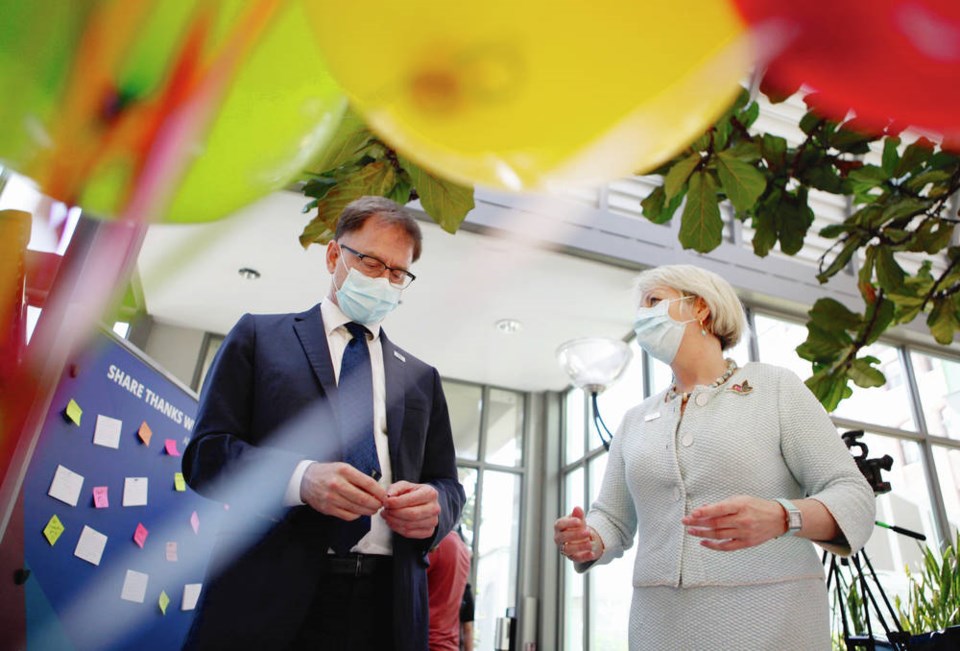The Delta variant was responsible for all new COVID-19 cases in Island Health from July 11 to 24, data from the B.C. Centre for Disease Control shows.
Reports attribute all 44 new cases in Island Health during those two weeks to the highly infectious variant, although the Centre for Disease Control says that could change as more samples are sequenced.
As the Delta variant drives a rise in cases, 32 new cases were reported in Island Health Wednesday for a 24-hour period that saw 342 new cases in the province. Fifty-five people are in hospital with COVID-19 in B.C., including 23 in intensive care. On the Island, one person is in hospital and none are in intensive care.
Daniel Coombs, a mathematics professor at the University of B.C. with expertise in epidemic modelling, said the Island has seen a significant increase in cases, with 32 for a 24-hour period reported Wednesday, versus 30 in the week of July 18-24.
Coombs said the province is likely in the early stages of sustained case growth, and while he anticipates a rise in hospitalizations and deaths to follow, vaccinations will probably keep those numbers down.
“It’s unlikely that we’re going to see the same kind of hospitalization growth or levels of deaths that we would have seen previously, because so many people are vaccinated. There’s just not as many people around to get really sick,” he said.
In the province, 81.5 per cent of eligible people have been vaccinated at least once and nearly 68 per cent have had two doses, the Health Ministry said.
Evidence from the United Kingdom shows that for unvaccinated people, the risk of severe infection is twice as high with the Delta virus compared to other strains circulating in B.C., Coombs said. For those who are vaccinated, the more infectious variant doesn’t pose a big difference in risk, he said.
“I’m doubly vaccinated. I recognize that there’s a low risk of being infected with COVID, but I also recognize that if I do get infected, it’s almost surely going to be a comparatively mild infection compared to if I was not vaccinated,” Coombs said.
The number of COVID-19 cases caused by the Delta variant is doubling every seven to 10 days in B.C., experts say.
Prof. Sarah Otto of the University of British Columbia said the variant, which first became prominent in India, is displacing the one that originated in the United Kingdom and is now the most common variant in the province.
She said the Delta variant increases the viral load by “about one-thousand-fold,” making it much easier to catch and transmit.
Otto, an expert in the university’s zoology department on the mathematical models of pandemic growth and evolution, said B.C. is beginning a fourth wave of COVID-19 infections, but how high it will get and how fast it will rise depends on everybody’s behaviour.
The two things people can do to prevent the wave from getting “very high” is get vaccinated and avoid indoor crowded spaces without a mask, she said.
Victoria resident Barbara Quinn said she cut short a shopping trip to Mayfair Shopping Centre recently after seeing too many unmasked people crowded together. She said she’s felt the same anxiety in downtown stores and wandering the Inner Harbour.
“It’s throngs of people, and mostly not masked, so I just thought I’m going to retreat again,” she said.
For Quinn, the easing of restrictions has felt too sudden, and she’s not ready to return to her normal activities.
Frederick Grouzet, an associate professor of psychology at the University of Victoria, said it’s not surprising people are feeling anxious as restrictions ease.
Where once they relied on physical distancing and wearing masks to protect themselves, now the main method of protection has shifted to vaccinations, which aren’t visible, which means they have to simply trust other people, he said.
“If the other person doesn’t wear a mask [and] I don’t wear a mask, am I safe or not? It’s the unknown that could generate this anxiety,” Grouzet said.
Grouzet said that anxiety is compounded by apprehension about others after a year behind screens.
regan-elliott@timescolonist.com



